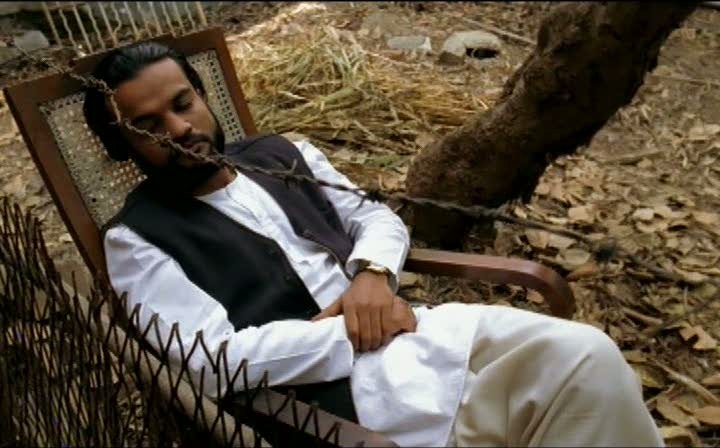After a long day filled with chatter, horns, heat, money, receipts, polite conversations, organization, it took me a while to settle into Amit Dutta’s ‘Aadmi Ki Aurat aur Anya Kahaniyan‘.
The story of a man and his room near a tree (Pedh par Kamra by Vinod Kumar Shukla) shared by rats, pigeons, kites, crows, squirrels and snakes, dragged me back reluctantly into a time and space zone that I have left long ago.
That time and space cannot be visited cursorily because its silence either sucks you in, or excludes you completely. Usually, the best you can manage is a sentimental nostalgic trip which even while it happens, wrenches your guts with its fakeness.
At first, I was impatient. Do I really want to see a tree and a room near it, right now? Beautiful shots, yes, but what do they mean? I was also impatient with the actors, with their style of performance, a dialogue delivery that seemed to emanate from somewhere far away, body and face self-contained.
But within minutes, I seemed to sink through the mud into clear water beneath, or much like Harry Potter, I suddenly found myself on Platform no. Nine and Three-Quarters
That sharp longing to go back, to believe that one can go back, where as the landlord says, “No, I haven’t increased the rent.” The leaves, the still water, the branches of trees, the shadows of banisters and the patches of sunlight, they are all the same, your memory for once is in tandem with reality. And for a brief while, you do forget that the rents in fact, never stop increasing.
When the story changes, I squirm, I think, now the magic will be broken, the magic that took long enough to come through for me. But the film moves smoothly into a newer realm. A husband who is disturbed unnaturally by the tatoo on his wife’s arm, the tatoo that proclaims her name to the entire neighborhood, that somehow reduces his possession of her. A tale of masculinity, (Aadmi ki Aurat by Vinod Kumar Shukla) emphasized by the upturn of the actor’s moustache. And yet, as I watch the spray of water from the air cooling units, the man stretched out in the grass, surrendering to the sky, I wonder, does a man feel so deeply, as deeply as a woman, this nebulous beauty of nature. And yes, the man resolves his confusion with love, with his woman’s name embroidered on a pillow cover, taking the pride of place in his living room.
Yet again, the story changes, and takes you now, from nature to the city, a city that has changed forever, a concrete city, a harsh city, a city that knows no forgiveness. Manto’s city of prostitutes and pimps, a girl who wants to sleep, who has no sympathy with her client’s sympathy for her. Unremitting, as harsh as the 100 watt bulb glaring into your eyes (Sau Candle Power ka Bulb by Saadat Hasan Manto).
Three stories, three cameramen, and yet, the pictures painted belong to one steady, sure hand. The actors mentioned that they worked according to the principles of ‘Neti, Neti‘ as expounded in the Upanishads. That is, taking away what was not needed. Throughout the workshop, they took away from their performances, unnecessary props, unnecessary gestures, unnecessary expressions. What is left then is only their relation to the space, the frame, as if each frame were a painting, and the actors as much a part of the painting as the light, the brush strokes, the negative spaces.
An actor mentioned that above all, the director wanted the actors to look graceful, whatever they were doing. This requirement infuses the film with a sense of human dignity, despite the frailty and the weakness of its characters. Though there is a sadness in the stories, the film does not leave you with discontentment or despair.
But with a desire to watch the sun and the moon again, to sit quietly with a friend and tell a tale, to listen to a story because it can tell you something about where you are and why you are there.
*PEDH PAR KAMRA – A room on the tree
AADMI KI AURAT – The man’s woman
SAU CANDLE POWER KA BULB – 100 watt bulb



Hi Batul, Been reading your blog on and off as life permits. Your stories.. and heartfelt wise words keep you hooked like a balloon to it’s string. 🙂
Also, not being physically present in India, it’s kinda tough to indulge in as much arthouse cinema as I used to. Do you know of any online repository where I could access movies like these and khargosh for a small fee?
thanks,
– m
Mona, Thanks so much for your comment.
Hmm, I’m not sure where you could access these films online. But it’s a good idea, no, for a website. Someone should think of hosting it.
Hell yes! Email me if you wanna discuss this further! 🙂